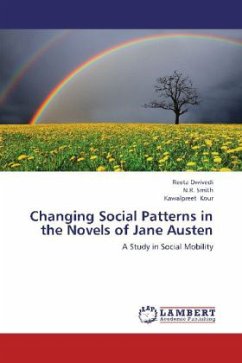Jane Austen s novels present a classic example of social mobility. Seen in her novels is change of culture, exposure to a new culture, a new set of values, virtues or morality. The novelist uses satire to poke fun at the behavior of some class-conscious characters. Changes in the domestic life of the people also find a place in the novels, but the change was primarily in middle class families. The most potent agent of this change was marriage. Women being dependent on their father before marriage and on their husbands after it, marriage was the most important event in the life of women to make or mar their future. The choice of a wealthy life-partner was therefore, necessary for their social security. Thus, it is that the most popular novel of Jane Austen begins with the subject of marriage. An attempt has been made in this book to bring into focus the state of social life in the times of Jane Austen and the agents that were effecting changes in the traditional social set-up.
Bitte wählen Sie Ihr Anliegen aus.
Rechnungen
Retourenschein anfordern
Bestellstatus
Storno








